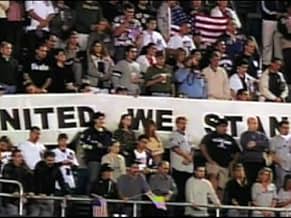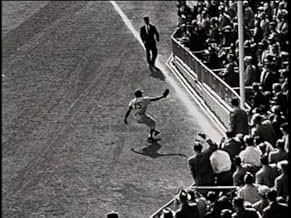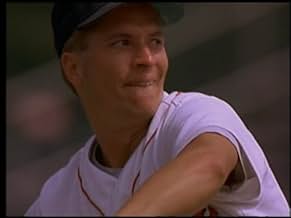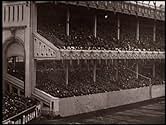अपनी भाषा में प्लॉट जोड़ेंA documentary on the history of the sport with major topics including Afro-American players, player/team owner relations and the resilience of the game.A documentary on the history of the sport with major topics including Afro-American players, player/team owner relations and the resilience of the game.A documentary on the history of the sport with major topics including Afro-American players, player/team owner relations and the resilience of the game.
- 1 प्राइमटाइम एमी जीते
- 3 जीत और कुल 5 नामांकन
फ़ीचर्ड समीक्षाएं
The music is pitch perfect. Burns sticks with an Americana theme for his soundtrack. Variations on "Take Me Out to the Ballgame" and "The Star-Spangled Banner" provide the primary background music. They are joined by a number of classic baseball songs and tunes that defined generations. The music puts you in the era and adds to the simultaneous definitions of the game and the country.
The storytelling style was a bit jilting at first. Each inning is told in segments. A title pops up on the screen, and then that story is related. At the end of that segment, a postscript is added that may or may not have anything to do with the preceding tale. Initially that was disorienting, but once one realizes how the doc is going to work, it's no longer bothersome.
Ken Burns' defining technique is his use of still pictures, panning and zooming over and around them in a fashion that nearly brings them to life. Accompanied by various ballpark sound effects, that style is perfect for the game of baseball. The deliberate pace of the documentary matches the deliberate pace of the game. But most remarkable about "Baseball" is the archival footage. Antique film of early century heroes like Ty Cobb and Babe Ruth literally caused my jaw to drop at times. I had no idea such video existed, and seeing all the classic footage for the first time is like being introduced to a whole new ballgame and cast of characters. Oddly enough, the entire film works better before colorized film and photos are introduced. Perhaps because of the romantic nature of monochromatic hues. Perhaps because they seem new and fresh when compared to the colors we are bombarded with today. Whatever the reason, the first two-thirds of "Baseball" stand out, due in part to the simple yet elegant pictures.
Aside from the archival footage, the highlights of the documentary were not the historical accounts themselves, but rather the commentary by various people who expound upon the intricacies of baseball. Bob Costas reminds us that baseball is a beautiful game. Robert Creamer explains the social aspect of baseball. Billy Crystal tells of his wide-eyed attitude as a youngster. Moments like these will bring a smile to your face, as you nod your head enthusiastically in agreement.
Through the 1950s, Burns covers everything I could think of, along with many great tangents. A major theme to that point is race, as Burns consistently makes a point to explain how baseball is not just a game but also a social barometer. Side stories such as the history of the ballpark frank and "Take Me Out to the Ballgame" provide the documentary with a well-roundedness that appeals to people besides the hard-core baseball fan.
My only complaint about this piece of work is a common one. A little too much Northeast bias once the series hit the 1960s. Up to that point, I didn't notice much, probably because baseball did more or less revolve around New York and Boston until expansion. But since the 1960s, the game has truly become national, even international, and I feel that the documentary didn't quite reflect that. Admittedly, the expansion of the game made it more difficult to cover all that has happened in the last quarter century. Also, part of the reason I felt shortchanged was undoubtedly because I am familiar with a larger number of recent events and knew more about what was absent. I realize that with the final 25 years crammed into one two hour episode, many great events had to be truncated or eliminated, but I was still left mildly disappointed.
Like the players that participated in the game it describes, this mini-series is not perfect. However, to maintain the baseball analogy, Ken Burns' documentary is both Hank Aaron and Roger Maris...er, Barry Bonds. It has phenomenal singular moments and also has the longevity to attain Hall of Fame status.
Bottom Line: The scope of "Baseball" combines with the dead-on moments to present a near perfect history and explanation of why baseball is the greatest game ever. 10 of 10.
Burns decided to create a narrative that is obviously more of an anecdotal history of baseball than a comprehensive history of the entire sport. The amazing aspect of the film is how much he was able to expound upon in 9 parts, which may seem like a lot until you realize the film is trying to cover a 150-year history that encompasses thousands of players and millions of fans. And just about every story is worth the time allotted to it. From the discredited legend of Colonel Abner Doubleday supposedly inventing baseball to the Owner's Collusion and Price-Fixing Scandal of the 1980's, "Baseball" presents a lengthy narrative that covers the major events and people who populated the sport at the nation-wide level of the American public consciousness, each of which could be a documentary by itself. The derivation of baseball from Rounders and Cricket, the first baseball scandal of the late 19th century, the many company teams of the late 19th and early 20th centuries, the African-American Black leagues, the first African-American players who were driven from the white leagues, the first successful female player, the press' role in covering games, the "curse" of the Boston Red Sox (with an amazing story by Bob Costas) and the mediocre Chicago Cubs who at one point were garnering more attendance than the Yankees paint an historical portrait with all the colors and subtleties that tell us so much about what is good and not so good in America.
Burns I think chose those incidents that either reflected the historical context of their times or captured the spirit of America's strangest yet most-loved pastime. Of course the price was the absence of lesser-known teams and personalities. However, if he had left out the likes of Casey Stengel, Yogi Berra, or Joe Dimagio, baseball historians and fanatics would have cried foul that you can't have a baseball documentary without these people. And other incidents, such as the Black Sox scandal of 1919 demonstrated that baseball players were still little better off than working class Americans. My personal favorite episodes chronicled the early years of professional baseball with the likes of Christie Mathewson, Walter Johnson, Honus Wagner, and Ty Cobb. Cobb was probably the most controversial of all American sports figures, and some sports writers view him as an embarrassment to baseball despite his lifetime batting average which still stands. (Later in his life, Cobb was kicked out of a San Francisco men's club for cheating at poker.) Love him or vilify him, Cobb was a personification of what was (and is) best and worst in America. And I must mention the little piece about Rube Waddall who was possibly the strangest character to infiltrate major league pitching. His story is worth the price of admission as he makes Billy Martin appear like a very stable and confident person.
One of the historical facts that is explored is the race discrimination that was enforced by all the white-run major league baseball teams until the 1940's. In response, African-Americans created the so-called Black Leagues which ended up making almost as much revenue as their white counterparts. Some have criticized that the documentary spent too much time on this issue, but I strongly disagree. This is a very important issue as it showed how professional baseball was, at first, as racially segregated as other American institutions, but then became a beacon for racial integration. The willingness of Jackie Robinson, who realized he was in the for the fight of his life, and the foresightedness of Branch Rickey, then owner of the Brooklyn Dodgers, put Baseball on the forefront of racial integration. I think if there was ever a documentary that could instill in children, both black and white, the injustice of racism and prejudice, "Baseball" would probably impress them beyond other kinds of documentary material since it deals with baseball, a sport many of them are probably playing. Ironically, Major League Baseball ended up making tons of money when Jackie Robinson signed up with the Dodgers, as many African-American fans came to see his games when Brooklyn was on the road. Racial segregation was not only wrong, it was unprofitable!
An all-inclusive history of baseball would have been 90 hours long instead of 20, and therefore impossible. Thoroughly documenting every team's history would have taken over Burns' entire film-making career. Being an SF Giants fan myself, I was a bit disappointed that very little was spoken about my team after its move from New York, except an off-hand remark about Willie McCovey's shot that went right at the Yankee's short-stop in the 9th inning of the 7th game that ended the 1964 World Series. Some Yankee and Giants fans attending the game said it was the hardest hit ball they had ever seen. (I was not alive at the time but I have heard it oft-repeated from older Giants fans.) Simultaneously, I prefer subjects explored with depth than just glossing over names and dates. This is just about as good as American documentaries get. Maybe Major League Baseball teams should document their histories with Burns-like style.
Unfortunately, there is one major flaw: the obsession with Boston and (especially) New York. While in some sense this is forgivable - highlighting these cities added some structure and continuity to the narrative, in others, it was blatant favoritism. For example, episode 7 is called "The Capital of Baseball", which can be seen as referring to many things metaphorically, but most directly, to New York City. To put things in perspective, the New York Yankees won the World Series in 1947, 1949, 1950, 1951, 1952, 1953, 1956, 1958, 1961, and 1962. When, in 1960, Bill Mazeroski hit a dramatic home run in the 9th inning of game 7 to win the World Series for the long-suffering Pittsburgh Pirates, the focus was not on the joy of Pittsburgh (or the rest of the country) in seeing the mighty Yankees / New York Teams finally tamed. No, the focus was on the shock and sadness felt by Yankees fans and players. We get to hear comedian Billy Crystal tell us how crushed he felt, despite the previous Yankee championships and even though we see from other segments with him that he seemed to change his allegiances from Yankees to (Brooklyn) Dodgers to Mets as the winds blew. Sorry if I have a hard time sympathizing.
It also stands to note that while doubtlessly others will nitpick here and there about things that have been left out of Burns' telling, none stands out more than the omission of the 1980 National League Championship Series between the Phillies and Astros, which unquestionably ranks as the best playoff series ever played between two teams in the history of baseball. But, no, that's left out and instead you get another 10 minute story about New York instead.
Still, don't let my comments distract from the overall greatness of this series. Highly, highly recommended.
However, there is a major flaw in the series - especially the later parts - its very evident New York bias. The people being interviewed, aside from former players, all seem to be New Yorkers. In the segment about the Dodgers and Giants moving west, for example, we are repeatedly told how it was a horrible tragedy for the teams to leave New York, but it's barely mentioned that, before those teams left, New York was barely supporting them, or that, while New York had three major league teams, the entire western half of the United States had none. And while some attention was payed to the post-move Dodgers (specifically Sandy Koufax), the episode on the 60s pretty much ignored the post-move Giants, even though their teams included several future Hall of Famers, including Willie Mays, Willie McCovey, Juan Marichal, Orlando Cepeda, and Gaylord Perry. I'm sure other teams were similarly overlooked in favor of the Yankees and Red Sox, but as a Giants fan, that especially stood out for me.
क्या आपको पता है
- ट्रिवियाIronically, first aired in the fall of 1994 when much of the season and the World Series were cancelled due to a strike. This made it the only "baseball" available to millions of unhappy fans at what should have been the most exciting time of the season.
- भाव
Narrator: It is played everywhere. In parks and playgrounds and prison yards. In back alleys and farmers' fields. By small children and old men. Raw amateurs and millionaire professionals. It is a leisurely game that demands blinding speed. The only game in which the defense has the ball. It follows the seasons, beginning each year with the fond expectancy of springtime, and ending with the hard facts of autumn. It is a haunted game, in which every player is measured against the ghosts of all who have gone before. Most of all, it is about time and timelessness. Speed and grace. Failure and loss. Imperishable hope. And coming home.
- कनेक्शनFeatured in WatchMojo: Top 10 Documentary Mini Series (2015)
टॉप पसंद
- How many seasons does Baseball have?Alexa द्वारा संचालित
विवरण
- चलने की अवधि1 घंटा 44 मिनट
- रंग
- ध्वनि मिश्रण
- पक्ष अनुपात
- 16:9 HD
- 4:3
इस पेज में योगदान दें



































